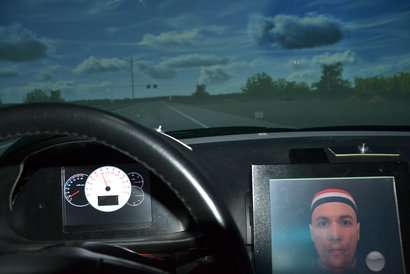Virtual driver can increase confidence in self-driving car

Self-driving cars are what we can all expect to see in the future. But will drivers be willing to leave control to technology? Behavioral scientist Frank Verberne at Eindhoven University of Technology (TU/e) believes a virtual driver can help. In his PhD research he shows how you can make sure these 'drivers' can trust people, and bring the acceptance of self-driving cars a step closer. He gained his PhD on Tuesday 21 April.
Self-driving cars can offer a lot of advantages: they can reduce traffic fatalities, road congestion and fuel consumption. It looks like only a matter of time before technology takes over control. Or not? We shouldn't forget that people must want to use cars like that, says TU/e researcher Frank Verberne. "Otherwise we'll be stuck with smart cars that nobody wants to drive."
Confidence
Accepting this new technology will require trust. And how can you create that with self-driving cars? Verberne believes the answer can be found in people's social reactions to intelligent systems. "For example, people give their cars names, or they get angry with their computer when it doesn't do what they want it to. So I've tried to find a way that builds confidence among people in the same was as it does with technology."
Resemblance
Verberne looked specifically to resemblance characteristics. Extensive research has shown that you gain more confidence in someone when that person has resemble you in certain characteristics. He then used this finding in tests with a virtual person, an animated face mounted on a monitor screen placed in front of a driving simulator. This virtual person looked similar to – or in other cases different from – the test subject in its appearance, head movements and thought patterns. Then Verberne measured the level of confidence in the specific virtual person.
Virtual driver
As might been expected, the level of confidence of the test person increased with that person's resembles to the subject. "This shows that a combination of similarity factors in a virtual driver can increase confidence", says Verberne. In other words this could be a good way to get people to hand over control at an earlier stage to a self-driving car. "It also means that people don't hand over control to complicated technology, but instead to a virtual driver who looks similar to another human being."
Provided by Eindhoven University of Technology





















